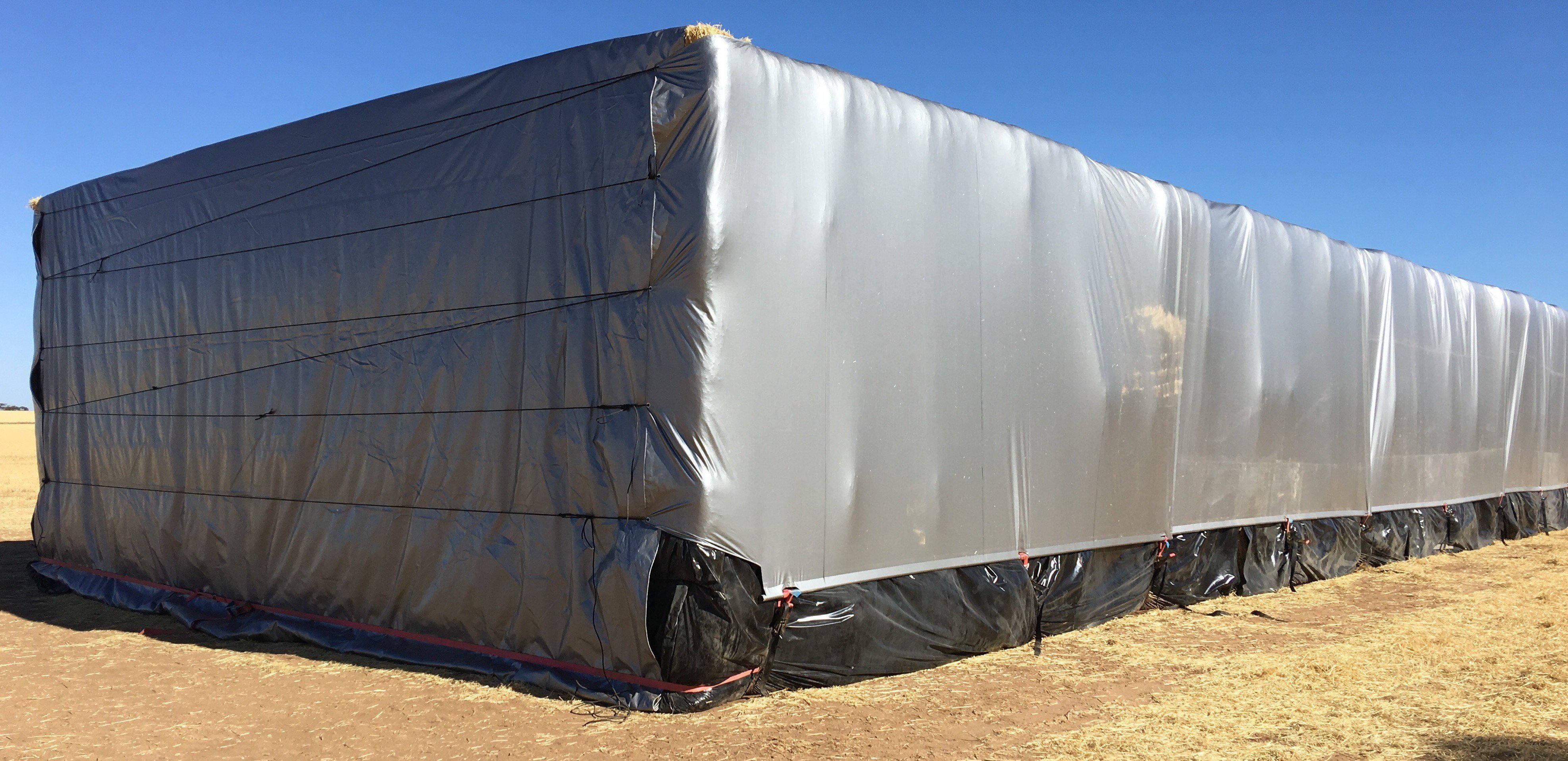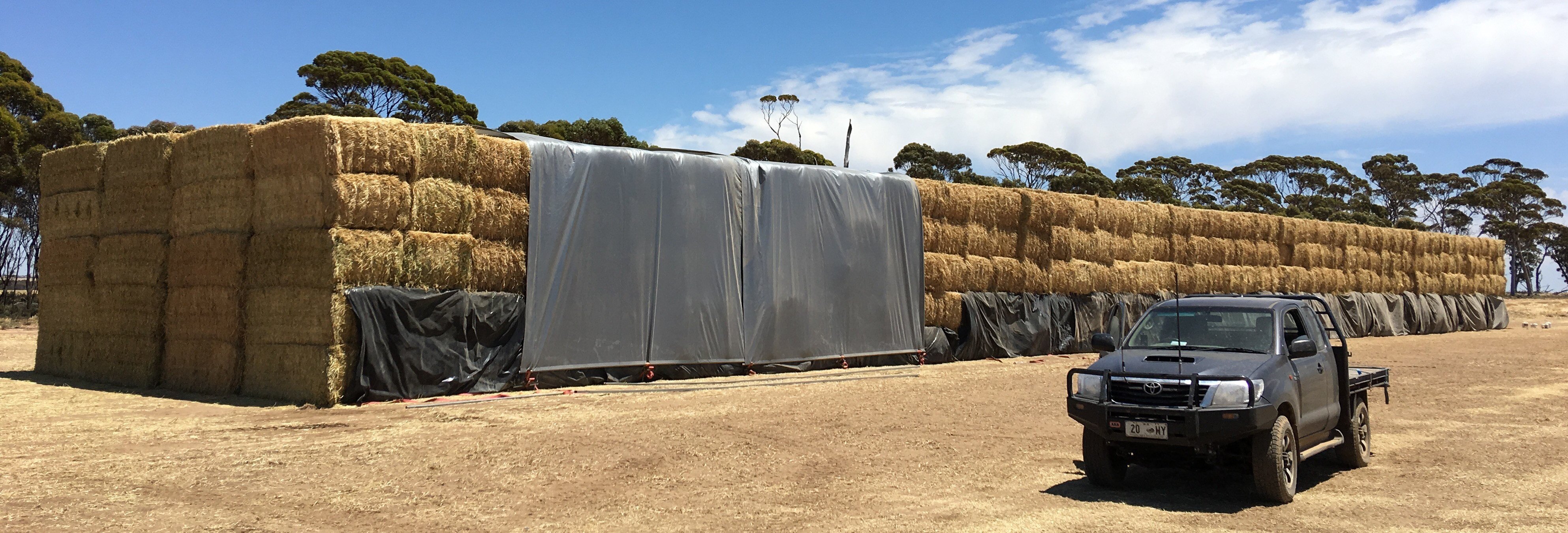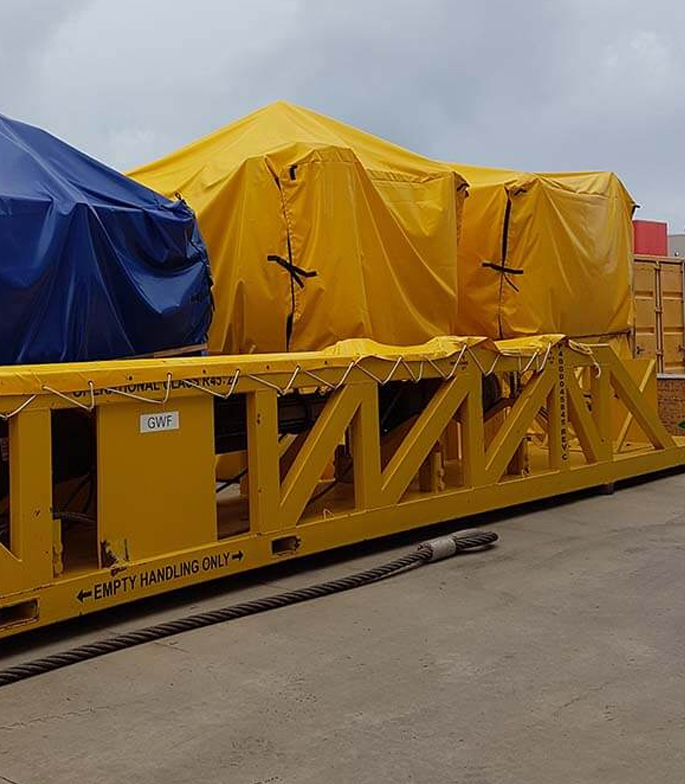Westarp Hay Tarps – Keep your Hay Protected from Weathering
As we know, hay is subject to at least 10-25% loss (and in some cases a lot higher) due to weathering. Don’t be caught out, Westarp produce custom tarpaulin systems for hay to suit round bales, large square bales & small square bales for any size stack. Retain 100% profitability and nutrient value by keeping your hay covered.
One of our most common designs incorporate pockets on the edge of the tarp with metal pipes or webbing and ratchet tie-downs, this keeps the edges tight and straight and eliminates the possibility of wind getting under and damaging the tarp from excessive flapping.
In this article, we take a closer look at the importance of protecting hay bales from excess sunlight, rain, and moisture. We also discuss the best way to store hay and what to look for when purchasing a waterproof tarp.

The importance of protecting hay with waterproof tarps
Buyers and transporters don’t like mouldy or rotten hay. There are examples of uncovered stacks losing 50% of the bales due to this, proving yet again that hay not stored correctly costs money due to high losses.
Unfortunately, rain can damage hay in several ways. Rain leaches soluble nutrients and keeps the moisture level high, thus increasing the likelihood of decay and mould. Hay rained on during paddock drying damages legume hay more than grass hay. The drier the hay when rain occurs, the greater the damage.
By keeping hay bales properly stored, you not only ensure that your own livestock receives high-quality hay all year round, but you also make your hay more marketable to be sold to other livestock owners. When livestock owners are looking to buy hay, they look for bales that have been stored correctly and will thus be the most nutritious for the livestock.
How to properly store hay bales for a long or short period
It is so important to understand how to properly store hay bales so that they can be used all year round. Plan your storage before you begin! Before you begin stacking and storing your hay bales, think about a system that will keep the oldest bales towards the front. When you need hay, you’ll want to use the oldest hay first instead of letting it sit in the back for too long.
Never let hay bales stay uncovered outside, exposed to sunlight and rain. Hay that is exposed to sun for too long will dry out and lose its nutrients, and hay that soaks up rainwater is more likely to grow mould.
Keep hay covered under a waterproof tarp and stored in an elevated area and sealed surface to protect it from the outdoor weather. Hay bales that come in direct contact with the ground will deteriorate faster, so it is important to have some sort of sealed surface or barrier between the ground and the hay bales.
How do you keep a tarp from tearing in the wind?
In addition to sun and rain, excessive wind can be a problem when storing hay. If wind can get under the tarp and cause it to flap or billow excessively, this may damage the tarp over time and make it ineffective at keeping moisture out.
One of the best ways to prevent this from happening is to design the tarp cover with pockets on the edge where metal pipes can be placed or with webbing and ratchet tie-downs. These methods will help keep the edges of the tarp tight and straight, preventing wind from getting underneath and causing too much flapping.
How long will a tarp last outside?
“How long will a tarp last?” is a common question. A number of factors affect how long a tarp will last outside, including:
- the type of material it is made from
- whether or not it offers UV protection
- the environmental conditions it is exposed to
- the quality of the design
What is the longest-lasting tarp material?
Heavy-duty tarps are typically made from polyethylene, polypropylene, or polyvinyl chloride. These materials are well known for their waterproof properties and durability. They should last 5 to 10 years and can cope with tough Australian outdoor conditions.
Of course, the quality of the design can affect the longevity of a hay tarp. That’s why at Westarp we custom design our products as standard. We understand that no two projects are identical. Having a custom-designed tarp can significantly increase its effectiveness and durability.
Are heavy-duty tarps waterproof?
Some tarps are manufactured to be water-resistant, and others are classified as waterproof. Water-resistant tarps, such as canvas tarps, may repel water and provide protection from light rain. However, waterproof tarps offer maximum protection from wet weather.
What kind of tarps are waterproof?
Waterproof tarps are most commonly made with a coating of polyvinyl chloride (PVC) or polypropylene (PP). These two thermoplastics offer a number of advantages that make them a good choice for manufacturing waterproof tarps.
PVC is highly durable, lightweight, and fire-resistant due to its high chlorine content. PVC tarps are also resistant to tears and abrasions, making them even more durable in tough conditions.
PP is a tough, lightweight material that offers excellent waterproof and dirt-resistant properties. PP tarps are often manufactured with a specialized weave pattern to resist tearing.
At Westarp, we manufacture custom waterproof tarps from three heavy-duty fabrics.
- Linear-400 is a polypropylene (PP) based fabric that is coated twice on both sides.
- Flexile-FR is a spread coated polyvinyl chloride (PVC) with a gloss acrylic lacquer on both sides.
- Armor X-900 is a 900 GSM polyester coated PVC with an acrylic lacquer on both sides.
Are tarps UV resistant?
A good tarp will offer UV protection, but not all tarps are manufactured for maximum sun protection. As with any other material, ultraviolet (UV) radiation will cause damage to tarps over time, significantly reducing their lifespan. That’s why it’s so important that tarps that are going to be used for heavy-duty applications should be manufactured to be UV resistant.
The polypropylene and PVC tarps that we manufacture at Westarp all offer excellent UV resistance to cope with the harsh Australian sun. This makes them ideal for hay coverings as well as a wide range of other heavy-duty applications across the agricultural, construction, transport, and mining industries.
Features to look for when buying a waterproof tarp
Not all tarps are made the same, and it’s important to choose a tarp made from high-quality materials to ensure the complete protection of your hay bales.
Some of the most important features to look for are:
- Quick and easy to use and pack away
- Able to be set up at any site
- Lightweight and durable
- Offers UV protection
- Manufactured as individual sections so the stack size can vary
- Waterproof tarp for hay protection
- Able to withstand strong winds
- Cater for long term storage e.g. 1-2 years
- Fitted End Cap Tarps for each end of the Stack
- Standard modular tarp sections used between both end caps
- Pockets taking metal pipe which are ratchet strapped down to tension the tarp
Buyers and transporters don’t like mouldy or rotten hay, and there are examples of uncovered stacks losing 50% of the bales due to this. Proving yet again that hay not stored correctly costs money due to high losses.
Unfortunately, rain can damage hay in several ways. Rain leaches soluble nutrients and keeps the moisture level high, thus increasing the likelihood of decay and mould. Hay rained on during paddock drying damages legume hay more than grass hay and the drier the hay when rain occurs, the greater the damage.

In keeping hay bales properly stored, you not only ensure that your own livestock receives high-quality hay all year round, but you also make your hay more marketable to be sold to other livestock owners. When livestock owners are looking to buy hay, they look for bales that have been stored correctly and will thus be the most nutritious for the livestock.
Buy custom hay tarps with Westarp
Whether you want your hay tarpaulin covers for single row stacks, based on truckload size of 2.4m wide (1 bale) by 12m long (10 bales), or designed for extra-large Haystacks, Westarp is your leading supplier of Custom Tarp Covers in Australia for Australian Conditions.
Why choose us?
- Custom is our standard – we design and manufacture for your specific needs.
- Extensive industry experience – we have worked with a large number of farmers and agricultural businesses to find the best tarp solutions.
- Built to last – our heavy duty waterproof tarps are designed to cope with real Australian conditions.
- Excellent customer service – we’re committed to providing the highest quality products on time, every time.
Call us on (08) 9690 1111 or book custom made tarps online today.




William Snellex (Base Fabrication)